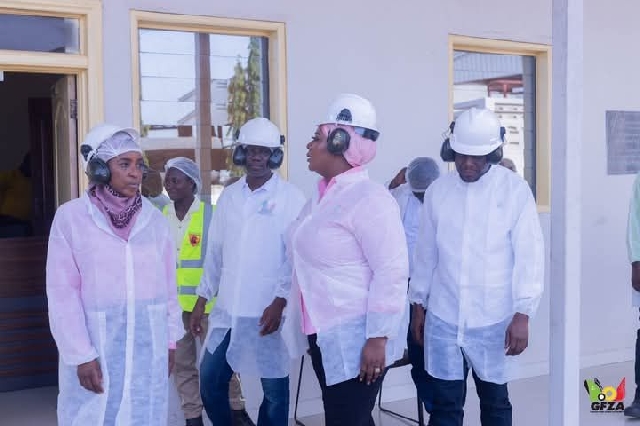W/R: GFZA boss embarks on strategic tour To Boost Investment and industrial growth
 Dr. Mary Awusi and her team in Western Region
Dr. Mary Awusi and her team in Western Region
In a bold move to strengthen regional economic growth and attract new investments, the Chief Executive Officer of the Ghana Free Zones Authority (GFZA), Dr. Mary Awusi, has concluded a high-level tour of some key Free Zone Enterprises (FZEs) in the Western Region.
The visit, her first official working engagement since assuming office, was designed to offer first-hand insight into the operations of licensed FZEs, identify operational challenges, and explore opportunities to attract fresh investments into the sector.
Dr. Awusi was accompanied by the Deputy CEO (Operations), Mr. Apau Wiredu Lateef, along with other senior officials from the GFZA.
The delegation visited a number of strategic industrial facilities, including:
Yaeric Company Limited (Abura, Axim) – a wholly Ghanaian-owned manufacturing firm
Marco Polo Tile Group Ghana Limited (Nyankrom, Shama) – producers of sanitary ware for export
Plot Enterprises Ghana Limited (Anoe, Sekondi) – a cocoa processing plant with Ivorian-Ghanaian partnership
Jintao Sanitary Ware Ghana Limited (Eshiem, Sekondi)
Chemsolv – a chemical solutions provider with a pan-African export reach
During the visits, some enterprises—particularly Yaeric and Marco Polo—highlighted persistent raw material shortages, such as rubber and clay, as major impediments to production continuity and growth.
Engaging directly with business leaders, Dr. Awusi reaffirmed GFZA’s commitment to creating a supportive and business-friendly environment for industrial players.
“Our goal is to provide timely support and build linkages that allow enterprises not just to survive but to grow sustainably.
We are aligning industrial operations with the President’s 24-hour economy vision, which is key to Ghana’s broader transformation agenda,” she stated.
Dr. Awusi also expressed confidence in Ghana’s capacity to attract strategic investors, particularly in underexplored sectors like manufacturing, agri-business, and industrial services.
She noted that this push would accelerate value addition, reduce the country’s dependency on imports, and generate jobs across all regions.
Source: Classfmonline.com/Cecil Mensah
Trending Business

IACG targets 1,000 market traders and artisans in the Western and Western North Regions as part 2025 micro business clinics
10:28
Basintale blocks renewal of Zoomlion's contract if salary remains GH¢250
13:14
MDF forum pushes for mineral revenues to benefit mining communities
09:38
MPs assure Zoomlion of gov't's prompt debt settlement
11:24
GoldBod begins licensing of gold trading service providers
11:48
President Mahama appoints Capt. James Richmond Quayson as the Director of Takoradi Port
13:10
Replicate Kwahu Business Forum nationwide- UCC don to Mahama
09:27
Better Ghana Alliance rebuts DPPF’s hailing of KGL as Africa’s top lotto company
09:13
New policies will hurt mining sector growth - Minority to gov’t
08:27
Ato Forson leads Ghana to participate in first IMF /World Bank Spring Meetings in Washington DC
02:50




